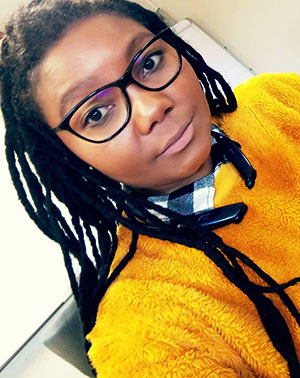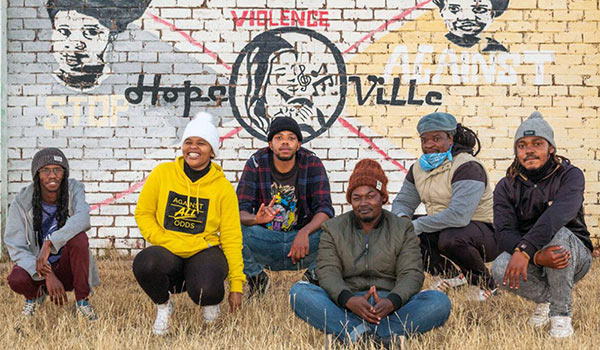

The PhD research of Dr Vuyolwethu Seti from Unisa’s Department of Communication Science in the College of Human Sciences has been used in a song called National address by the Hopeville Art Movement.
The doctoral research of Dr Vuyolwethu Seti from Unisa’s Department of Communication Science is reaching the South African community through a song called National address by the Hopeville Art Movement. The College of Human Sciences scholar was approached by the Eastern Cape non-profit group following the completion of her PhD entitled On blackness: The role and positionality of black public intellectuals in post-94 South Africa. Her voice is sampled in the song and is from an October 2019 interview that she did with Power FM following her graduation.
Seti says that she was really proud to be involved with the project because the song corroborates her thesis; it brings it to life in a way that is understood at a grassroots level. "The thinking about the black condition happens everywhere and is not limited to the academy. Our job as academics is to join the struggles of thinkers in and outside of academic corridors if black consciousness is to succeed."
Dr Seti’s research explores the role and positionality of three Black public intellectuals in post-94 South Africa, namely, Simphiwe Dana, Ntsiki Mazwai and Sisonke Msimang. She analysed the Twitter postings shared by these intellectuals on various social matters that concern the condition of black people in post-94 South Africa. Using Frantz Fanon’s Native Intellectual Consciousness as a lens, her research seeks to capture and evaluate an emergent form of "cyber" activism in the country.
The main argument of her PhD research is that the concept and function of intellectualism must undergo a complete overhaul, beginning with the accommodation of more voices, particularly those of oppressed black women. For this reason, her research was based on these three black women and looked at dismantling the colonial lens through which black women are studied.
Seti says she was also only too happy to work with the Hopeville Art Movement because they are budding artists and their non-profit work in Whittlesea, Eastern Cape, definitely needs exposure. Speaking on behalf of the group, Khayalam "Kayak" Yawa, who is a poet, says the movement was established as an NPO late in 2016 by a group of about 10 young people.
He says the aim of their projects is to help heal some of the ills faced by their community. "We are here mainly to serve as the community’s educational and awakening tool. In this regard, we arrange for community dialogues, open mic sessions and a cappella competitions in order to communicate relevant information for our people. Through these efforts and events, we got to truly identify, hone, and expose local talent to relevant people."
Yawa says the song that featured Seti’s research is a melting pot, where hip hop and the spoken word work together to communicate a message. Involved in the making of the song were Yawa, rapper; Siyabulela "Knomze" Zenzile; vocalist; Bianca "Amahle Qha!" Mgqabuzana, rapper; Ntsikelelo "Ikhalipha" Bill; Luyanda "Mr Goods" July; Prince "Olympars" Stemele; and Seti.
Speaking on the motivation for the song, Yawa says: "Each of our black lives haven’t mattered for eons now, and this has happened at all levels in society. This does not mean that we weren't or aren’t doing anything about it; we were, and are. But for years we have been without a leader who really understand us, a leader who really understands the core of our struggle."

Members of the Hopeville Art Movement involved in the making of the song, National address: Siyabulela "Knomze" Zenzile, Bianca "Amahle Qha!" Mgqabuzana, Prince "Olympars" Stemele, Khayalam "Kayak" Yawa, Luyanda "Mr Goods" July and Ntsikelelo "Ikhalipha" Bill
He says when they heard Seti’s interview, and her discussion on the "township design", they realised in that moment that they had a platform to work from. "Dr Seti, through her PhD, represented us, the wretched of this land. She possesses a trait not found in most black intellectuals. She helped us as artists, to put all our riots into a song - after all, we are the voices of the voiceless. We thank her for letting us use her voice and thoughts."
With regard to future plans for the song, Yawa says they are hoping to have it available in all digital stores so that it can be downloaded. They would also appreciate some airtime, and recording deals, as that would really be a game-changer. "Imagine the difference we can make with songs such as ours, with research such as Dr Seti’s, in transforming the mindsets of the people, and therefore our livelihoods."
* By Rivonia Naidu-Hoffmeester, Communications and Marketing Specialist, College of Human Sciences
Publish date: 2020-07-04 00:00:00.0